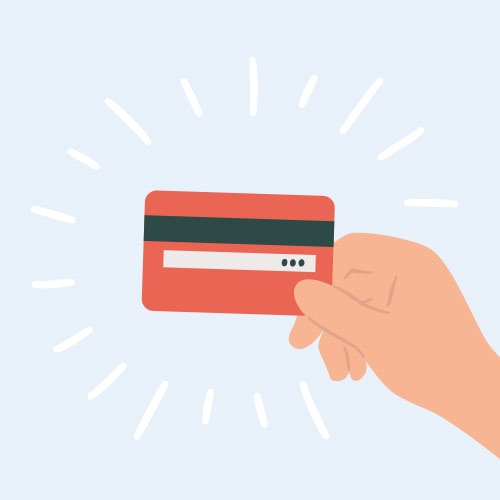
For many college students, a credit card represents an opportunity to enjoy more spending flexibility. A credit card can also be a tool for building your credit as you lay the foundation of your financial future. Responsible credit card management can go a long way toward demonstrating your commitment to good financial habits.
How do you manage your card responsibly? These seven tips may help.
Understand How Credit Works
Let’s start with the basics. Make sure you understand how credit works and why it’s important to build good credit. In short, building good credit means building a history of responsible money management. It helps you establish a strong credit score, which serves as a quick reference tool for lenders and others who want to be assured that you are conscientious about managing your money before they engage in a financial relationship with you. This can impact everything from borrowing money for a car to student loans to renting an apartment.
Used wisely, a credit card can be helpful for building your credit. When you pay your monthly credit card bills on time, every time, and you don’t overspend, those healthy financial habits will be reflected in your credit history and credit score.
Understand How Credit Cards Work

A credit card can be used to make purchases (online and in person) and to pay bills. It works as a kind of short-term loan: You can buy now, using the credit card company’s money, and pay them back later by paying your monthly credit card bill.
When a credit card company considers your application, they evaluate your credit history, credit score and income to determine whether you meet their criteria for creditworthiness. If they decide to issue you a card, then they set a credit limit, which is the amount of money available for you to charge against. While there is no “typical” credit card limit for a college student, student credit cards — cards designed specifically for college students with a limited credit history — tend to have lower limits than standard cards: often $1,000 or less.
Don't Open Too Many Credit Cards
There are a couple of good reasons to stick with a single credit card at this point in your financial journey. First, it will give you the chance to get the hang of managing a credit card without having to juggle multiple balances and repayment dates. Second, it will protect your credit from multiple “hard inquiries” — requests by card issuers to review your credit report — which can negatively impact your credit score.
Always Pay Your Monthly Bill on Time

The best way to manage your credit card is to pay your monthly bill in full and on time each and every month. If you occasionally find yourself in a position where you can’t pay off the full balance, make at least the minimum payment due, by the due date. Be aware, though, that any unpaid balance will be subject to interest charges that will be added to the amount you owe. The APR, or annual percentage rate, specified on your credit card account statement is the percentage that will be applied to your balance to determine how much that extra charge will be.
If you don’t make at least the minimum payment by the due date, the card issuer can charge you late fees in addition to interest. Repeated missed payments can also result in a higher APR for your card, damage to your credit score and credit report (payment history weighs heavily into your credit score), and even having your credit card account closed.
Consider setting up alerts or automatic payments from your bank account so you never miss a payment.
Only Charge What You Can Pay Off
If you’re unable to pay your credit card bill in full each month and you carry a balance from month to month, interest charges can snowball. That’s why it’s important to charge only as much as you know you can comfortably pay off at the end of each month. Be sure to track your expenditures just as you do with your debit card so there are no surprises when your bill comes.
Also keep in mind that using too much of your available credit can be harmful to your credit score. A common recommendation is to keep your credit utilization ratio — the amount of credit you’re currently using divided by your total credit limit — under 30%. For example, if you have a $1,000 credit limit, you should keep your credit card balance under $300 to continue building good credit.
Avoid Fees
In addition to potential late fees, some cards charge annual fees — fees imposed simply for carrying a particular card. Why take on that expense when plenty of cards don’t charge an annual fee? A student card may be a good choice, since these cards typically have no annual fee. Check with your bank to see what options they offer for college students.
Check Your Credit Score Regularly
Once you start using your credit card, be sure to check your credit score regularly. There are a number of free monitoring services available online, and you can request a free credit report from each of the three credit reporting bureaus — Experian, Equifax and TransUnion — once a year. If you ever see an error or fraudulent activity on your credit report, alert the reporting bureaus to have it wiped from your history. Don’t let inaccurate information or illegitimate charges undo your hard work!
Sources:
“5 Credit Card Tips For College Students,” Bankrate, July 25, 2023 https://www.bankrate.com/finance/credit-cards/credit-card-tips-for-college-students/
“7 Credit Tips For College Kids From a Debt Expert,” CNBC, July 26, 2023 https://www.cnbc.com/select/credit-tips-for-college-kids/
“5 Tips for Using Your Student Credit Card Responsibly,” NerdWallet, July 7, 2023 https://www.nerdwallet.com/article/credit-cards/top-credit-card-tips-students
“How Do Credit Cards Work?” Investopedia, April 28, 2023
https://www.investopedia.com/how-do-credit-cards-work-5025119
“What Is a Credit Utilization Rate?” Experian, 2023
https://www.experian.com/blogs/ask-experian/credit-education/score-basics/credit-utilization-rate/
“Student vs. Secured Credit Cards: Which Should You Choose?” The Ascent, February 15, 2023
https://www.fool.com/the-ascent/credit-cards/student-vs-secured-credit-cards/







